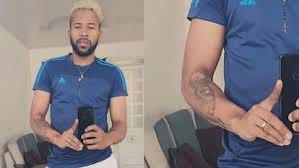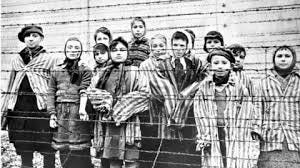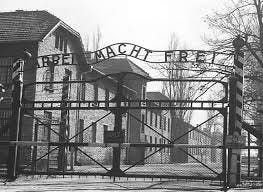In Venezuela, he was a star. Now he’s a prisoner, about to be deported. The photo’s a little blurry, but you can still make it out: on a man’s forearm, a tattooed soccer ball wears a crown. Is he a gang member?
Last week, news outlets ran pictures of supposed Venezuelan gang members. Dressed in white shirts and white shorts, their heads bowed, handcuffed men sat in rows awaiting their flight to El Salvador.
As they were marched to the plane, federal authorities kept the men’s heads down. I couldn’t help wondering what those men in white were feeling. But I knew what I was feeling: sick to my stomach and anxious as those men’s rights were trampled without due process.
Sadness and fear mixed in a crucible of bile. I wasn’t only outraged at their treatment. Their fate seemed way too familiar.
In high school, I’d been fascinated and horrified by stories about the Holocaust. I may have mentioned before that I once plucked a battered paperback with the cover torn off from a donation box and then stayed up all night to read it.
Around four in the morning, I finally finished the story about Nazi doctors experimenting on female inmates in a concentration camp. The story, told in first person, affected me so deeply that I phoned my then-boyfriend, who was getting ready for his construction job.
On the phone, I was so hysterical that I wonder if he understood half of what I tried to say: that the cruelty, sadism and injustice visited on the camp prisoners terrified me in a way nothing else ever had. And now, these Venezuelans are being deported to a notorious El Salvadoran prison in ways that echo the atrocities of World War II in Europe.
Apparently, our government is so sure these guys are members of the Tren de Aragua gang, that even a blurry tattoo is solid evidence. The poor man claims it’s a soccer ball with a crown on it, and he happens to be a soccer star from Venezuela. I don’t know what the gang ink looks like, but I’ll bet it’s not a soccer ball.
The Jews of Auschwitz had tattoos, too. They weren’t given any due process and were treated inhumanely just because the regime had the power and the guns to do so. Nobody got to prove they were innocent. People were just declared unuseful and shipped out—many never to be seen alive again.
The Third Reich’s top brass used ancient Nordic myths as a pretense for their inhumanity. The superior Aryan race had to be preserved, so anyone without a blond, blue-eyed non-Jewish heritage was poisoning the blood of the country. Sound familiar? They began by culling disabled or political opponents, but it was a short leap to separating out the gypsies, the homosexuals, the Jews.
Seeing the men being deported to El Salvador, I wonder why their heads are shoved down. Why are they being paraded before cameras as if they’ve already been found guilty? The administration is using an obscure law from 1798 to justify these deportations, yet the targets don’t appear to have had court proceedings.
The admin claims it has determined that all are members of a gang but haven’t provided evidence of due diligence. In fact, a federal judge called information submitted today “woefully inadequate.” Although the Nazis kept detailed records, they tried to destroy incriminating evidence after the allies freed the camps.
All of this is infuriating because I believe in the rule of law. But it’s the soccer star with the arm tat who haunts me. Will he, and others like him, disappear in that El Salvadorian prison? Will he become a lost soul, unknown to his descendants?
That struggle, to know where you’re from and who you are, has chased me all my life. Maybe only adoptees and orphans understand the depth of the desire to know where your roots lie. My mother remarried when I was around four years old, but the subject of adoption was forbidden in our home.
My stepfather was fine and had adopted me, but I still longed to know my biological roots. Because of my messy history (Mom was a young teenager at my birth and then I contracted polio), nobody in my family would tell me anything about my father or my early years.
Mom also lived with tons of shame— if I asked questions, she’d cry. When at age seven or so, I found an original birth certificate and asked why my last name was different, she burst into tears. My stepfather sternly warned me never to make Mom cry like that. Ever.
For decades I tried to locate my biological father. It’s hard to describe the hollow feeling that adoptees and orphans can experience. All I knew was that I’d never rest until I found out where I came from and who I was.
I was in my forties when I finally located him. I loved my adoptive father and waited until after he’d passed away to search more openly. Lucky for me, Bio Dad wanted to find me too, so my story has a happy ending.
For those who lived through the Holocaust, finding roots hasn’t always been so easy. People were ripped from their parents; whole families were murdered. The elderly remnants may never figure out who they are.
As for the Venezuelans, many families maintain they’re not gang members. I hope it doesn’t take decades to sort out the Tren de Aragua tattoos from the soccer balls.
The man with the crowned ball tattoo reminds me that our loving God has, throughout history, urged us to give hospitality to strangers. My bio-Dad was a complete stranger to me—but I yearned to find him anyway. And I’m glad I did.
Stand up for the aliens among us, lest we sink farther into fear of the other. The God of love, of mercy, of justice commands us to reach out in hospitality, or at least due process. Because every single one of us longs to know who we are.













I admire your ability to express yourself so clearly in writing, and I appreciate you sharing it with the rest of us. Hannah
You said it all, Linda. No way to top that. April Fools Day is cancelled since nothing can be more Foolish than what is happening in USA National leadership these days.